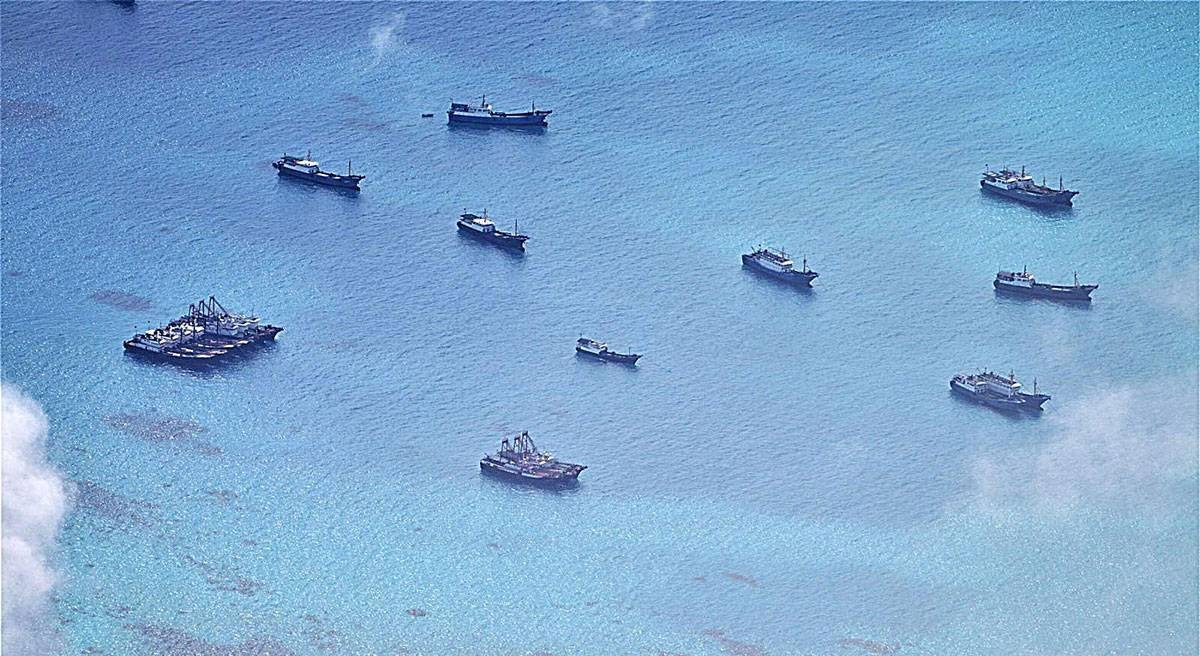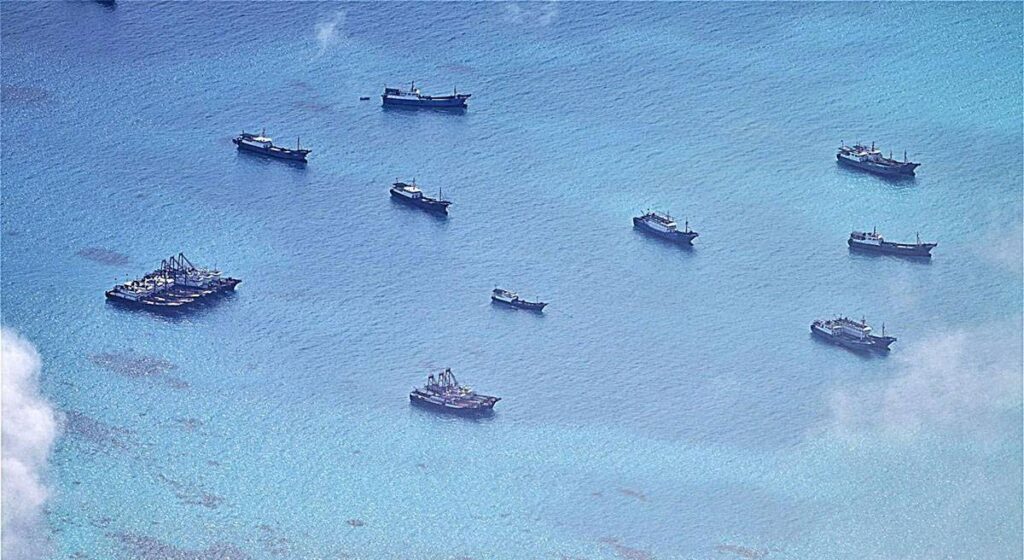SOME political and security experts are not optimistic about the prospects of having the 10-member Association of Southeast Asian Nations (Asean) come up with a united front to resolve the maritime disputes in the West Philippine Sea (WPS).
Asean is composed of Brunei, Cambodia, Indonesia, Laos, Malaysia, Myanmar, Singapore, Thailand, Vietnam and the Philippines.
The Philippines and China have overlapping claims in the South China Sea (SCS).
Efforts to address maritime issues in the SCS become more complicated as three other Asean members also have stakes in the Spratlys: Brunei, Malaysia and Vietnam.

In January 2013, the administration of former president Benigno Aquino 3rd questioned before the Permanent Court of Arbitration (PCA) in The Hague, Netherlands China’s nine-dash line policy in the SCS, which encroached on the Philippines’ exclusive economic zone (EEZ).
On July 12, 2016 the PCA rendered a landmark award that rejected China’s expansive maritime claims. It ruled that China’s nine-dash line encroaches on the maritime entitlements of other coastal states, including the EEZ and extended continental shelf of the Philippines, and was incompatible with the provision of the United Nations Convention on the Law of the Sea (Unclos).
Department of Foreign Affairs (DFA) Undersecretary Jesus Domingo earlier said, “before the decision to file was made in 2013, and for the years it took to a decision, there were moments that the Philippines felt it stood alone.”
“We are heartened that in the 7 years since the Award, the number of countries that have expressed support for the rule of law, and specifically for the 2016 Arbitral Award, has been growing. Perhaps that is due to the growing number of opinions from experts who have studied the strategy and the outcome, and have appreciated the clarity that the award provides on the questions of maritime entitlements, among others,” he said.
“There is majesty to be found in the award’s being definitive and final. No threat of might can challenge its undeniable status, and no subversive manipulation can diminish its conclusive truths,” Domingo said last July 12 in a forum that commemorated the seventh anniversary of the arbitral award.
The Philippines “is proud to contribute this to the practice of international law, and welcome the support expressed by the international community,” he added.
Prof. Victor Andres “Dindo” Manhit, Stratbase ADR Institute president, told The Manila Times that in order for the Asean to come together, “all members must recognize the arbitral ruling whether or not they are directly affected by the hostilities of China in maritime areas.
“Unless the members of the Asean push their national interests aside in favor of larger interests such as regional peace and security, the Asean’s well-meaning statements of solidarity will only amount to empty promises,” he said.
Manhit added, “Some concerns with the existing maritime issues lie in the fact that China would prefer bilateral negotiations with the countries that are directly affected.”
“The problem that comes with that is countries negotiating with China on their own have less leverage than Asean negotiating as a whole,” he pointed out.
“Only when Asean can come together not only through a strong Declaration of Conduct, but through enforcement mechanisms against hostilities can the issue in the West Philippine Sea be solved effectively,” Manhit stressed.
Beyond the Asean, support from the neighboring Indo-Pacific nations, the European Union, the United Kingdom, Canada and the United States is crucial in enforcing rules-based order in the West Philippine Sea and in the South China Sea at large, he said.
Dr. Rommel Banlaoi, Philippine Institute for Peace, Violence and Terrorism Research chairman, said Asean should conclude with China the negotiation on the Code of Conduct (CoC) in the South China Sea “to promote good order at sea through appropriate behaviors set by the code.”
However, he said territorial disputes and maritime jurisdictional conflicts in the SCS can only be resolved through peaceful negotiated settlements by concerned parties.
“Asean cannot resolve conflicts, but can provide conducive regional environment for parties to resolve conflicts,” Banlaoi said in a text message to The Manila Times.
Foreign Affairs Secretary Enrique Manalo had called on fellow Asean foreign ministers to ensure that their countries socioeconomic gains “are not undercut by threats to regional peace, security and stability as well as major power rivalries.”
He made the appeal in his omnibus intervention during the Asean Post Ministerial Conference 10+1 session with China, held in Jakarta, Indonesia last July 13.
“This is possible only by reaffirming and strengthening, in the context of the regional security architecture, Asean Centrality, which is aimed at fostering a path [toward]development and prosperity in the region,” he said.
Regarding developments in the South China Sea, Manalo called for the “effective management and peaceful resolution of disputes in accordance with international law.”
“We welcome the completion of the second reading of the Single Draft Code of Conduct Negotiating Text and look forward to continuing the CoC negotiations in Manila in August, with a view towards adopting an effective and substantive CoC,” he added.
DFA Undersecretary Maria Theresa Lazaro Lazaro said it is “impossible to imagine a CoC for the South China Sea being negotiated outside the framework of Asean.”
“This is a process that perseveres, despite the pressures of destabilizing actions and incidents of harassment and intimidation,” Lazaro said last July 12 in a video message to the Stratbase ADRi forum on the seventh anniversary of the arbitral award.
All parties seeking the successful conclusion of a CoC in the SCS “must contribute to creating conditions of confidence and trust, and an atmosphere of peace and stability to ensure success,” she said.
“Asean has forged itself as a hub for dialogue and cooperation in broader Asia, many of whose actors are part of and have shifted their proverbial political and economic rudder [toward] the Indo-Pacific,” she said.
The Philippines, Lazaro said, believes that there is no better alternative to a rules-based international order under the Charter of the United Nations.
“Our belief in the rules-based international order was a motivation for the Philippines in taking the legal route against China on the West Philippine Sea,” Lazaro said.
She said the issue of the WPS is not only a matter of national interest but of national sovereignty and territorial integrity with the latter two being superior in national significance than the former.
“Hence, taking China to the Permanent Court of Arbitration on the West Philippine Sea is as much a matter of defending our national sovereignty and territorial integrity as it is about promoting our national interest,” Lazaro said.
“And the legal route that we took did not disappoint us with the resulting favorable 2016 Arbitral Award, which authoritatively ruled that China’s ‘nine-dash line’ had no basis in law and is without legal effect,” she added.
Lazaro said as an “affirmation” of the dispute resolution mechanisms of the Unclos, the 2016 Award not only sets reason and right in the South China Sea, “but is an inspiration for how matters should be considered — through reason and right — by States facing similarly challenging circumstances.”
Moreover, she said the award not only upheld the Philippines’ sovereign rights and jurisdiction, but also affirmed that certain actions by China within the Philippines’ EEZ “violated our sovereign rights, and were, thus, unlawful and a violation of international conventions.”
“Having been made final, the award is no longer contestable and is beyond compromise. It is now a part of international law. We firmly reject attempts to deliberately diminish or undermine the award’s definitive legal effects in international law,” she stressed.
Lazaro said “with strong legal standing and complementary nexus, the Unclos and the South China Sea Arbitration Award of July 12, 2016 are the twin anchors of the Philippines’ policy and actions on the West Philippine Sea.”
“Moving forward, we will continue to uphold our sovereignty, sovereign rights and jurisdiction in the West Philippine Sea,” the DFA official said.
With urgency, Lazaro said the Philippines would also continue to press for a CoC in the SCS through Asean “based on Unclos, and one that considers the interests of all stakeholders beyond Asean and China” in order to ensure that the South China Sea remains a “sea of peace, a sea of security and stability, and of prosperity.”
Source : The Manila Times


